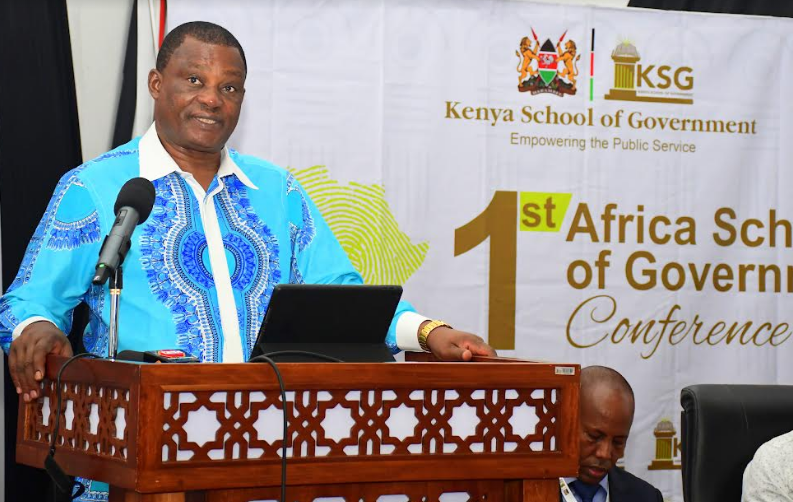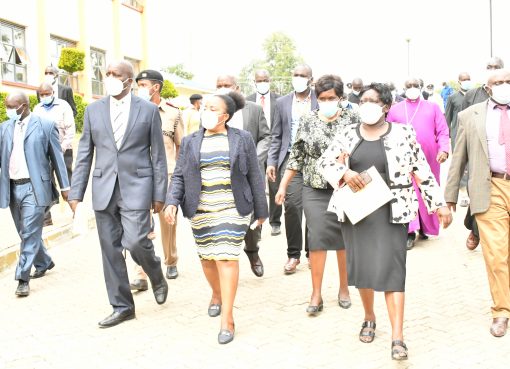The unified approach to public service training, CS Muturi noted, will churn out leaders with unwavering allegiance to their governments, possess the ability to evaluate policy implications, are focused on delivering public services efficiently and effectively, and are committed to implementing administrative decisions regardless of personal preferences.
The CS on Tuesday opened the 1st Africa Schools of Government Conference hosted by the Kenya School of Government (KSG), Mombasa Campus.
The conference delegates are drawn from Schools of Government, Independent Commissions, Regulatory and Enforcement Agencies, Devolved Governance Institutions, Higher Learning Institutions, Ministries and Agencies, Multilateral and Bilateral Development Agencies, and Development and Governance Agencies.

The four-day forum is themed as “Advancing Africa’s Public Service Excellence: United in Pursuit to Realise Capable Institutions and Transformed Leadership”
In line with the theme, the conference will examine mechanisms of advancing public service excellence and pursue a unified approach to enhance the capacity building of Africa’s public service.
It is also a platform for collaboration and linkages between African Management Development Institutes (MDIs) and Schools of Government to engage in peer-to-peer learning as a strategy for delivering on their mandates.
CS Muturi noted that the Africa Agenda 2063, under the mantra “The Africa We Want”, envisioned advancing Public Sector Excellence through capable institutions and transformed leadership in Africa.
“This Conference today is united in pursuit of realising capable institutions and transformed leadership coordinated by the Premier Africa School of Government,” said the CS.
He added that the African Union (AU) Agenda 2063 clarion call is “Educate and Skill Africa for the 21st Century, and it aspires that heads of government, ministers, and senior public servants have access to the latest thinking on institutional reform, management, and leadership competencies that drive value creation in policy environments and governments.
The CS said that over the years KSG and MDIs have provided learning and development programmes to capacity-build public officers in different aspects of management and operations of Government in Kenya, the Region, and the Continent and beyond.
“We believe that the mission of KSG situates it in the middle of politics and public service, to solve some of the most contentious issues facing Africa’s leadership today,” stated CS Muturi.
“We also believe that by combining cutting-edge research, training, and direct interaction with practitioners, KSG has proven to be a capable institution with strong leadership to solve capacity building in Africa’s public service that no other institution can match,” he added.
The CS further underscored the need to change Africa for the better, be united in pursuit of realising capable institutions, and transform leadership by changing African schools of Government to build and develop cutting-edge programmes that can tackle, unlock, and develop transformative solutions to public challenges.
The delegates were urged to use their talents to foster a more diverse and inclusive African community everywhere they are called to serve.
“Change Africa’s public service, change it for the better, make it more humane, make it more just, make it more prosperous, and make it more peaceful,” encouraged the CS.
The Principal Secretary (PS) State Department for Public Service, Amos Gathecha, stated that capacity building of public servants is a prerequisite for the realisation of AU Agenda 2063.
“African governments must prioritise human capital development. We must agree that training forms our thinking and doing, and without training it would be impossible to implement any government agenda,” he said.
PS Gathecha noted that Schools of Government are obligated to carry out their mandate and remain responsive to the unique circumstances in their countries.
He reiterated calls for a unified African Approach in pursuit of excellence in public institutions and leadership.
The Schools of Government, he noted, should develop strategies to overcome challenges and barriers they encounter in the realisation of their mandates.
“We should embrace best practices to enhance the capacity building of public service and create collaboration and linkages between African MDIs/ Schools of government for robust engagement and peer-to-peer learning for innovation and continuous training,” he stated.
By Sadik Hassan and Mariam Sefu





